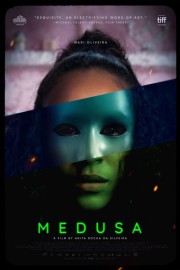Medusa
I read about the history of the Medusa myth shortly after finishing “Medusa,” the new film from director Anita Rocha da Silveira (who co-wrote the screenplay with Érica Sarmet), and what’s interesting is how the myth has evolved in meaning over the years. The film seems to have more in common with modern interpretations than Greek myth, and that makes sense, and by using it to comment on modern intersections of politics and faith in Brazil is a good way in. I don’t think da Silveira completely lands her punches, but for much of the film, I was captivated by the ideas she presented, and the way her film looked visually.
Mariana (Mari Oliveira) is a normal teenager, going to school, spending time with friends, and going to church. She sings in the choir at her evangelical church, with an enthusiastic pastor (Thiago Fragoso) and a lead vocalist (Lara Tremouroux) who preaches piety, and is an example to others. By day, they seem like normal teen girls- the kind that Mari’s aunt wants her cousin (who recently moved here) to spend time with- but by night, Mari and Michele (Tremouroux’s character) lead a gang of girls who will do whatever they can to make sure sinners repent, and accept Jesus. One night, one of these attacks goes wrong, leaving Mariana- who goes by Mari- scarred, setting her on a journey separate from her friends.
The gang wears masks so as not to be identified, but also use stories such as the one about Melissa- an actress who was attacked, and disfigured, by a woman not unlike Michele or Mari, at the start of the film- as a cautionary tale to keep the members in line. Melissa has all but disappeared, and stories run rampant about what happened to her. After Mari is scarred, she is fired from her job (at a plastic surgery office- her face is off-putting for those searching for enhanced beauty), and finds new work caring for long-term patients at a down-trodden clinic. There’s someone at the clinic who’s been in a coma for decades- is that Melissa? Mari’s curiosity might get her in trouble, or it might set her free from the iron-clad hold of the group she’s been with for years.
“Medusa’s” narrative hits on ideas of leaving cult-like groups, and the reality of what Christian nationalism means, but as it focuses on Mari and her trying to uncover the truth about Melissa, interest in the larger satirical points the film wants to make dissipates, leaving us feeling that making the story of Melissa more than just a cautionary tale, a modern-day myth, disjoints the film. The ending we’re left with almost reflects that disjointed nature. That being said, I’m a big fan of “Medusa” for much of its running time- it has a great atmosphere, production design, and strong performances; it just didn’t feel like it stuck the landing.










